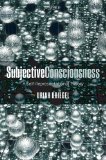Inside of a Dog: What Dogs See, Smell, and Know by Alexandra Horowitz (Scribner, 2009)

(link for UK)
Product description:
What do dogs know? How do they think? The answers will surprise and delight you as Alexandra Horowitz, a cognitive scientist, explains how dogs perceive their daily worlds, each other, and that other quirky animal, the human.
Inside of a Dog is a fresh look at the world of dogs — from the dog’s point of view. As a dog owner, Horowitz is naturally curious to learn what her dog thinks about and knows. And as a scientist, she is intent on understanding the minds of animals who cannot speak for themselves.
In clear, crisp prose, Horowitz introduces the reader to dogs’ perceptual and cognitive abilities and then draws a picture of what it might be like to be a dog. What’s it like to be able to smell not just every bit of open food in the house but also to smell sadness in humans or even the passage of time? How does a tiny dog manage to play successfully with a Great Dane? What is it like to hear the bodily vibrations of insects or the hum of a fluorescent light? Why must a person on a bicycle be chased? What’s it like to use your mouth as a hand? In short, what is it like for a dog to experience life from two feet off the ground, amidst the smells of the sidewalk, gazing at our ankles or knees?
Inside of a Dog explains these things and much more. The answers can be surprising — once we set aside our natural inclination to anthropomorphize dogs. Inside of a Dog also contains up-to-the-minute research — on dogs’ detection of disease, the secrets of their tails, and their skill at reading our attention — that Horowitz puts into useful context. Although not a formal training guide, Inside of a Dog has practical application for dog lovers interested in understanding why their dogs do what they do.
The relationship between dogs and humans is arguably the most fascinating animal-human bond because dogs evolved from wild creatures to become our companions, an adaptation that changed their bodies, brains, and behavior. Yet dogs always remain animals, familiar but mysterious. With a light touch and the weight of science behind her, Alexandra Horowitz examines the animal we think we know best but may actually understand the least. This book is as close as you can get to knowing about dogs without being a dog yourself.
Elephants on the Edge: What Animals Teach Us about Humanity by G.A. Bradshaw (Yale University Press, 2009)

(link for UK)
Product description from the publisher:
Drawing on accounts from India to Africa and California to Tennessee, and on research in neuroscience, psychology, and animal behavior, G. A. Bradshaw explores the minds, emotions, and lives of elephants. Wars, starvation, mass culls, poaching, and habitat loss have reduced elephant numbers from more than ten million to a few hundred thousand, leaving orphans bereft of the elders who would normally mentor them. As a consequence, traumatized elephants have become aggressive against people, other animals, and even one another; their behavior is comparable to that of humans who have experienced genocide, other types of violence, and social collapse. By exploring the elephant mind and experience in the wild and in captivity, Bradshaw bears witness to the breakdown of ancient elephant cultures.
All is not lost. People are working to save elephants by rescuing orphaned infants and rehabilitating adult zoo and circus elephants, using the same principles psychologists apply in treating humans who have survived trauma. Bradshaw urges us to support these and other models of elephant recovery and to solve pressing social and environmental crises affecting all animals, human or not.
The Philosophy of Animal Minds, ed. Robert W. Lurz (Cambridge University Press, 2009)

(link for UK)
Product description from the publisher:
This volume is a collection of fourteen new essays by leading philosophers on issues concerning the nature, existence, and our knowledge of animal minds. The nature of animal minds has been a topic of interest to philosophers since the origins of philosophy, and recent years have seen significant philosophical engagement with the subject. However, there is no volume that represents the current state of play in this important and growing field. The purpose of this volume is to highlight the state of the debate. The issues which are covered include whether and to what degree animals think in a language or in iconic structures, possess concepts, are conscious, self-aware, metacognize, attribute states of mind to others, and have emotions, as well as issues pertaining to our knowledge of and the scientific standards for attributing mental states to animals.
The Age of Empathy: Nature’s Lessons for a Kinder Society by Frans de Waal (Harmony, 2009)

(link for UK)
Product description from the publisher:
Are we our brothers’ keepers? Do we have an instinct for compassion? Or are we, as is often assumed, only on earth to serve our own survival and interests? In this thought-provoking book, the acclaimed author of Our Inner Ape examines how empathy comes naturally to a great variety of animals, including humans.
By studying social behaviors in animals, such as bonding, the herd instinct, the forming of trusting alliances, expressions of consolation, and conflict resolution, Frans de Waal demonstrates that animals–and humans–are “preprogrammed to reach out.” He has found that chimpanzees care for mates that are wounded by leopards, elephants offer “reassuring rumbles” to youngsters in distress, and dolphins support sick companions near the water’s surface to prevent them from drowning. From day one humans have innate sensitivities to faces, bodies, and voices; we’ve been designed to feel for one another.
De Waal’s theory runs counter to the assumption that humans are inherently selfish, which can be seen in the fields of politics, law, and finance, and which seems to be evidenced by the current greed-driven stock market collapse. But he cites the public’s outrage at the U.S. government’s lack of empathy in the wake of Hurricane Katrina as a significant shift in perspective–one that helped Barack Obama become elected and ushered in what may well become an Age of Empathy. Through a better understanding of empathy’s survival value in evolution, de Waal suggests, we can work together toward a more just society based on a more generous and accurate view of human nature.
Written in layman’s prose with a wealth of anecdotes, wry humor, and incisive intelligence, The Age of Empathy is essential reading for our embattled times.
Related titles: The Philosopher and the Wolf: Lessons in Love, Death, and Happiness by Mark Rowlands (link for UK)
The Wauchula Woods Accord: Toward a New Understanding of Animals by Charles Siebert (link for UK)
Animal Lessons: How They Teach Us to Be Human by Kelly Oliver (link for UK)
Wild Justice: The Moral Lives of Animals by Marc Bekoff and Jessica Pierce (link for UK)









